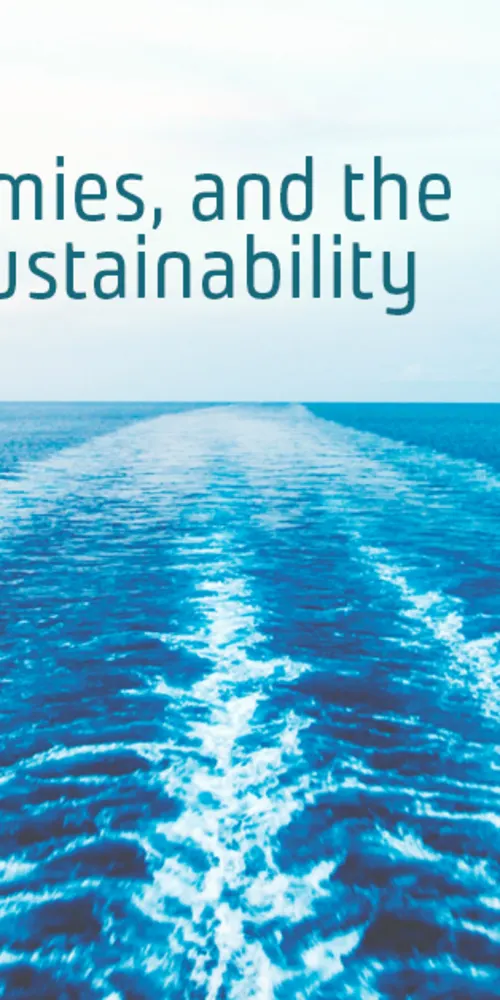Data, Blue Economies, and the future of ocean sustainability
We explore how data and marine information is underpinning the wider drive for ocean sustainability efforts.

In last week’s Compass Blog, we explored our recent conversation with Steffen Knodt, Head of the Sustainable Subsea Solutions Centre, Rostock. During the discussion, we delved into the Blue Economy, and Steffen’s views on how so-called ‘purpose-driven’ solutions have the potential to generate a tremendous impact on the sustainability and longevity of our oceans.
Before we dive into this topic further and explore how data underpins the Blue Economy, you may want to refresh yourself on our discussion with Steffen.
Read more: How Purpose-Driven Solutions Could Be The Key to Unlocking the Blue Economy
Data and its role in Blue Economic growth
According to The Commonweath, through whose work the term has been popularised, it’s best to think of the ‘Blue Economy’ as “an emerging concept which encourages better stewardship of our ocean or ‘blue’ resources.”
Clearly, this is inherently linked to aims and concepts of maritime decarbonisation, and can effectively be considered as the ultimate expansion of shipping’s aims to cut its sustainability impact: how can we, as an industry, ensure that we not only have minimal effect on the world, while also supporting the growth of vibrant ocean industries?
This is a key — if not particularly well understood — challenge for shipping to overcome. Shipping, alongside fishing, are the oldest ocean industries, and therefore have a deep responsibility to lead on the conservation and stewardship of the oceans.
But how does this impact ZeroNorth’s mission to digitalise shipping for the climate? The clue is in ‘digitalise’. Data, and using it correctly, is now widely recognised as the key to unlocking blue economic growth.
For example, The Nippon Foundation–GEBCO Seabed 2030 Project – created by a coalition of bodies interested in ocean development – is based around the concept of using data to first understand our oceans before we sustainably develop them.
For ZeroNorth’s part, we would agree with this approach. Our philosophy is based on taking data and turning it into actions. It is pleasing to see our core aims matching with wider efforts on the Blue Economy, and although we play a small part in the overall mission, we believe that if we can continue to champion the use of data to achieve profitable decarbonisation, we will also be supporting wider aims to conserve our oceans through data use.
Read more: Broadening Horizons: ZeroNorth & Spire Maritime Announce a New Data-Led Partnership
The future of ocean sustainability
Maritime sustainability, and therefore caring about our oceans, is at the heart of what we do. But it is also interesting to see how the wider concept of ocean sustainability is now increasingly factoring into maritime industry decision-making.
For example, the recent news that class society ABS would provide class notations on the United Nations’ Sustainable Development Goals is a sign that times are changing. As noted in their original announcement in December 2020, ABS launched the notation because of “growing interest in the SDGs from the maritime industry…it also provides a vehicle for demonstrating the sustainability of vessels to the investor side, which is increasingly vital.”
Meanwhile, the UN has also ‘doubled down’ on the preservation of the world’s oceans by declaring 2021-2030 the “UN Decade of Ocean Science”. This initiative will act as a lightning rod for significant collaboration and innovation in ocean science, geospatial information and conservation efforts. As a UN body, the International Maritime Organisation will no doubt have a part to play in supporting the Decade.
Taking this and the developments on the Blue Economy together, it is clear that this is not an isolated trend. We believe that this is part and parcel of a sector that is waking up to the wider role it has to play in the conservation of the marine environment. And if that wasn’t convincing enough, consider that the IMO has extraordinary jurisdiction over the world’s surface area – meaning that shipping is going to have to play a central part in preserving our oceans.
Just as Steffen recommended that shipping align itself around ‘purpose driven’ solutions – solutions that can have a symbiotic and beneficial impact to both operations and environment — it is also key that we think about the wider impact of our sustainability actions, aiming to contribute to a more positive and brighter ‘Blue Economy’ of the future. ZeroNorth, and many others, believes that data is a vital tool we have to make these goals a reality.